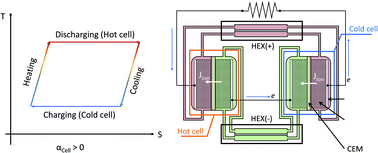Thermally regenerative electrochemically cycled flow batteries with pH neutral electrolytes for harvesting low-grade heat
Abstract
Harvesting waste heat with temperatures lower than 100 °C can improve the system efficiency and reduce greenhouse gas emissions, yet it has been a longstanding and challenging task. Electrochemical methods for harvesting low-grade heat have aroused research interest in recent years due to the relatively high effective temperature coefficient of the electrolytes (>1 mV K−1) compared with the thermopower of traditional thermoelectric devices. Compared with other electrochemical devices such as the temperature-variation based thermally regenerative electrochemical cycle and temperature-difference based thermogalvanic cells, the thermally regenerative electrochemically cycled flow battery (TREC-FB) has the advantages of providing a continuous power output, decoupling the heat source and heat sink, and recuperating heat, and compatible with stacking for scaling up. However, the TREC-FB suffers from the issue of stable operation due to the challenge of pH matching between catholyte and anolyte solutions with desirable temperature coefficients. In this work, we demonstrate a pH-neutral TREC-FB based on KI/KI3 and K3Fe(CN)6/K4Fe(CN)6 as the catholyte and anolyte, respectively, with a cell temperature coefficient of 1.9 mV K−1 and a power density of 9 μW cm−2. This work also presents a comprehensive model with a coupled analysis of mass transfer and reaction kinetics in a porous electrode that can accurately capture the flow rate dependence of the power density and energy conversion efficiency. We estimate that the efficiency of the pH-neutral TREC-FB can reach nearly 9% of the Carnot efficiency at the maximum power output with a temperature difference of 37 K. Via analysis, we identify that the mass transfer overpotential inside the porous electrode and the resistance of the ion exchange membrane are the two major factors limiting the efficiency and power density, pointing to directions for future improvements.



 Please wait while we load your content...
Please wait while we load your content...